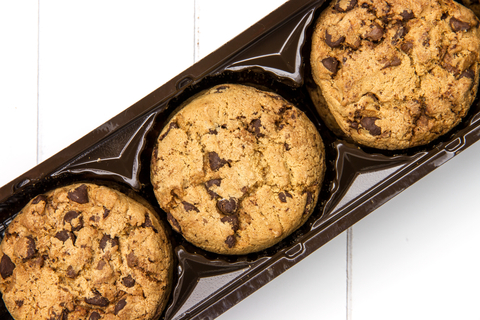There's a package of chocolate chip cookies sitting on the table at work. Six different people have six different thoughts about it.
Person A, who is trying to avoid gluten to lose weight, thinks of how every food on earth must have gluten.
Person B, who is watching fat, tries to guess how many grams it has.
Person C, who is trying to cut carbs, knows instantly this food doesn't fit into his daily allotment.
Person D, who is watching sugar, is certain there are at least 3 teaspoons of the white stuff. She can feel her insulin surging just thinking about it.
Person E, who tries to eat only real food, is disgusted by the long list of unpronounceable ingredients in just a cookie.
Person F doesn't think much about it besides "there's cookies."
Same cookie, negative perceptions
Each of these people, except person F, has a negative connotation about the same exact food item. So instead of just seeing a cookie, they see what they believe is bad in the food. But the worst part is this feeling sticks.
For example, Person D is looking for a reason to start eating sugar again because the scale didn't move that morning. So she ends up eating a few of the packaged cookies followed by eating ice cream later, and the whole week is blown. Person B, the low-carb eater, doesn't eat them but just seeing a forbidden food sets off a desire to eat because even though he knows he shouldn't, he loves sweets.
But person F forgot about the cookies almost as soon as she spotted them.
Different cookie, positive perceptions
Now let's see what would happen if we change things and the cookies had a different label to match each person's preference.
The sugar watcher would be delighted to find the cookie has less than a teaspoon of sugar. And the low fat guy would like that it is low fat, less than 3 grams. And the real food gal, being told they were made with natural ingredients, likes that there are no preservatives or high fructose corn syrup. Not only do they all partake, they each eat quite a bit.
But to person F, it's still just a cookie. She thinks of having one but really isn't feeling it today so she passes.
What gives?
A 2012 study in Eating Behaviors looked at how different dietary approaches affect how people relate to food. There were those that followed a restraint model of eating vs. moderation. In the study, restraint is defined as someone actively restricting foods or utilizing self control while moderation is "self-regulating eating based on responding to one's needs and desires in a reasonable manner." For example, a moderate eater might take small portions but feels totally comfortable going back for more if she's still hungry. Where a restrained eater might try to stick to certain rules of eating (low carb, low sugar, portion control etc.).
In a group of college students, restraint was linked to worry about weight, less (perceived) ability to manage weight, more emotional and binge eating and lower life satisfaction. On the other hand, those that were categorized as moderate eaters believed they could effectively manage their weight and had lower emotional and binge eating. Similar results were seen in a group of people about to go for weight loss surgery.
How you approach food translates to how in control you feel
If you noticed, person F is this type of moderate eater. Instead of a singular food or meal focus, she considers her diet as a whole. That doesn't mean she doesn't look at fat, sugar or preservatives but her eating is a balance of listening to internal cues, experiencing food satisfaction and considering health, not a set of inflexible food rules.
It's like the difference between someone who chooses to be happy and someone who let's circumstances decide happiness. The person who chooses happiness focuses on what he has control over -- his attitude. He reminds himself what really matters in life so the little stuff can't get to him. But the person who focuses on circumstances ends up frustrated because of life's inevitable ups and downs. He's letting all the little things get in the way of the most important thing: long-term happiness.
Whether it's happiness or our diet, when we take time to choose a healthy outlook, we feel more in control. For food, this is a big-picture, balanced approach that is flexible. And in the end eating is not only of better quality, it keeps us from using up all of our energy sweating the details.
What do you think when you see a cookie?
This post originally appeared on Maryann's blog, Raise Healthy Eaters.
